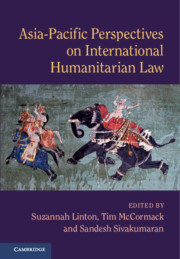Book contents
- Asia-Pacific Perspectives on International Humanitarian Law
- Asia-Pacific Perspectives on International Humanitarian Law
- Copyright page
- Contents
- Figures and Tables
- Contributors
- Foreword
- Foreword
- Acknowledgements
- Editors’ Note
- 1 Introduction: Asia-Pacific Perspectives on International Humanitarian Law
- Part I Interviews
- Part II Development of International Humanitarian Law
- Part III Practice and Application of International Humanitarian Law
- Part IV Implementation and Enforcement of International Humanitarian Law
- Part V Looking to the Future and Enhancing Compliance with International Humanitarian Law
- 36 International Humanitarian Law and Climate Change
- 37 Dialoguing with Islamic Fighters about International Humanitarian Law: Towards a Relational Normativity
- 38 Combined Exercises and International Humanitarian Law Training: Fostering a Culture of Norm Compliance?
- 39 Implementation of International Humanitarian Law in Southeast Asia: Challenges in the Prevention of Violations
- 40 Anticipating Operational Naval Warfare Issues in International Humanitarian Law That May Arise in the Event of a Conflict in the South China Sea
- 41 ‘Fire and Fury’ at the 38th Parallel: Exploring the Law of War’s Twilight Zones in a Potential Future Conflict on the Korean Peninsula
- Glossary of Publications
- Alphabetical Glossary of Cases and Decisions
- Chronological Glossary of Cases and Decisions
- Treaties and Other International Instruments, Resolutions and National Documents with an International Dimension
- Chronological Glossary of National Legislation and Secondary Instruments
- Peace Agreements and Communiques
- Abbreviations and Translations
- Index
37 - Dialoguing with Islamic Fighters about International Humanitarian Law: Towards a Relational Normativity
from Part V - Looking to the Future and Enhancing Compliance with International Humanitarian Law
Published online by Cambridge University Press: 18 October 2019
- Asia-Pacific Perspectives on International Humanitarian Law
- Asia-Pacific Perspectives on International Humanitarian Law
- Copyright page
- Contents
- Figures and Tables
- Contributors
- Foreword
- Foreword
- Acknowledgements
- Editors’ Note
- 1 Introduction: Asia-Pacific Perspectives on International Humanitarian Law
- Part I Interviews
- Part II Development of International Humanitarian Law
- Part III Practice and Application of International Humanitarian Law
- Part IV Implementation and Enforcement of International Humanitarian Law
- Part V Looking to the Future and Enhancing Compliance with International Humanitarian Law
- 36 International Humanitarian Law and Climate Change
- 37 Dialoguing with Islamic Fighters about International Humanitarian Law: Towards a Relational Normativity
- 38 Combined Exercises and International Humanitarian Law Training: Fostering a Culture of Norm Compliance?
- 39 Implementation of International Humanitarian Law in Southeast Asia: Challenges in the Prevention of Violations
- 40 Anticipating Operational Naval Warfare Issues in International Humanitarian Law That May Arise in the Event of a Conflict in the South China Sea
- 41 ‘Fire and Fury’ at the 38th Parallel: Exploring the Law of War’s Twilight Zones in a Potential Future Conflict on the Korean Peninsula
- Glossary of Publications
- Alphabetical Glossary of Cases and Decisions
- Chronological Glossary of Cases and Decisions
- Treaties and Other International Instruments, Resolutions and National Documents with an International Dimension
- Chronological Glossary of National Legislation and Secondary Instruments
- Peace Agreements and Communiques
- Abbreviations and Translations
- Index
Summary
Armed conflicts have proliferated over the years, across the Islamic world, ranging from North Africa, the Horn of Africa and the Middle East, to Central Asia and Southeast Asia. These conflicts have triggered various humanitarian debates on how to ensure compliance with the law of war in order to safeguard the precarious humanitarian situations on the battlefield of those participating in armed hostilities as well as the civilian population. The asymmetrical nature of the types of conflicts – regardless of their national and/or transnational characters – has rendered those humanitarian objectives increasingly more difficult. It has also raised the question of the very compatibility and adaptability of international humanitarian law (IHL) to govern contemporary warfare in those settings. Conversely, the classification of non-state armed groups (NSAGs) fighting the state armed forces in various theatres of conflict itself has pushed back such attempts to enhance compliance with and/or reform IHL. As a result, the jurisdictional scope of application of IHL has been denied under those circumstances and a humanitarian dialogue has been compromised. Providing training to and negotiating humanitarian access with Islamic fighters – now categorised as terrorists – on behalf of impartial humanitarian organisations has become increasingly difficult.
- Type
- Chapter
- Information
- Asia-Pacific Perspectives on International Humanitarian Law , pp. 656 - 669Publisher: Cambridge University PressPrint publication year: 2019



